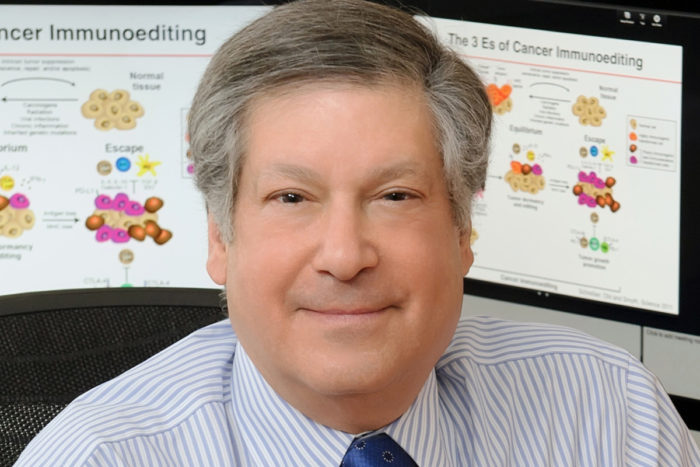Schreiber awarded Balzan Prize for pioneering cancer research
International honor recognizes scholarly and scientific achievements
 Washington University
Washington UniversitySchreiber, PhD, the Andrew M. and Jane M. Bursky Distinguished Professor at Washington University School of Medicine in St. Louis, has been named a co-recipient of the Balzan Prize for his work in immunology and melanoma research.
Robert D. Schreiber, PhD, the Andrew M. and Jane M. Bursky Distinguished Professor at Washington University School of Medicine in St. Louis, has been named a co-recipient of the Balzan Prize for his groundbreaking work in immunology and melanoma research.
This year’s prize winners were announced Monday, Sept. 11, in Milan. The award is meant to “foster culture, the sciences and the most meritorious initiatives in the cause of humanity, peace and fraternity among peoples throughout the world,” according to the International Balzan Prize Foundation.
Schreiber will receive the award Nov. 17 in Bern, Switzerland, with co-recipient James Allison, PhD, of the University of Texas MD Anderson Cancer Center. The honor comes with a $790,000 prize, half of which must go toward research.
“Professors Schreiber and Allison have played transformative roles in the field of tumor immunology,” said Balzan Prize committee member and French immunologist Jules Hoffmann, a recipient of the 2011 Nobel Prize in Physiology or Medicine, in announcing the award winners Monday. “Both have collaborated recently in the identification of tumor-specific neoantigens, together with other scientists, an approach that might lead to the development of effective personalized cancer-specific vaccines.”
By targeting tumor-specific neoantigens, which are formed during cancer development and are unique to each patient’s tumor, Schreiber and other scientists aim to eradicate cancer cells while sparing healthy ones.
Schreiber, who also is director of the Andrew M. and Jane M. Bursky Center for Human Immunology and Immunotherapy Programs at the School of Medicine and co-leader of the tumor immunology program at Siteman Cancer Center at Barnes-Jewish Hospital and Washington University School of Medicine, helped to pioneer our understanding of the immune system’s potential role in battling cancer. He and collaborators at the School of Medicine have laid the foundation for the development of personalized vaccines for patients with cancers of the breast, brain, lung, pancreas and prostate, melanoma and certain forms of lymphoma.
Balzan Prizes are awarded in four subject areas – two in the sciences and two in the humanities – that change every year.
The Balzan Foundation acts jointly through two foundations, one headquartered in Milan and the other in Zurich. The foundation’s General Prize Committee is composed of respected European scholars and scientists. Eugenio Balzan, for whom the foundation is named, was a leading figure in business and culture in Milan at the beginning of the 20th century.






